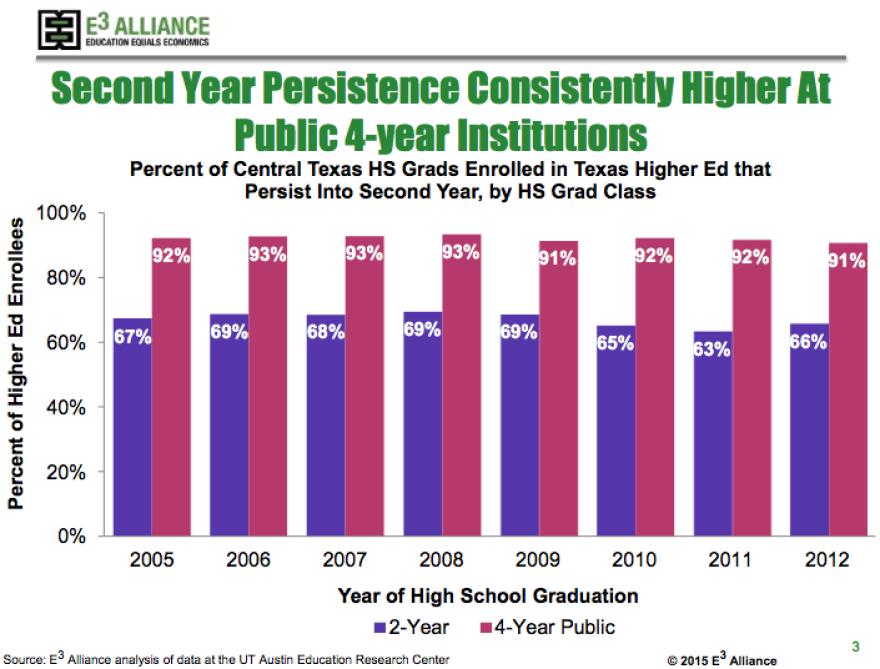To understand the challenges many college-bound students face, KUT’s Kate McGee followed three students this summer as they graduated high school and prepared for college. She tracked their progress on a Tumblr site, The Months Between.
More than 90 percent of Central Texas high school graduates plan to directly enroll in college in the fall, but only about 61 percent actually make it to class, according to the Austin Chamber of Commerce. It's a national phenomenon known as "Summer Melt."
Many of the students whose college plans get derailed are the first in their families to even think about getting a degree. Most come from low-income families who face so many barriers to college that the process becomes overwhelming. They miss deadlines or don't understand what they need to do to enroll. They end up waiting a semester or a year and never actually make it to college.
This week, we're telling these student's stories. But first, listen to KUT's Jennifer Stayton talk with Kate about the project.
Erika Carbajal-Ramos


When Erika Carbajal graduated from Ann Richard’s School for Young Women Leaders this spring, she thought she was going to Austin Community College in the fall. She didn’t get enough financial aid from the other schools she applied to and decided to wait another year before enrolling in a four-year school.
Statistically, Erika has a higher chance of making it to sophomore year if she attends a four-year college versus a two-year college.

Erika’s months between high school and college ended much differently than she anticipated.
Listen to how Erika’s summer went:
Mauricio Hernandez


Ever since Mauricio was a little kid, he’s wanted to make money. He skipped class in high school to detail cars. Still, he graduated and passed the state’s college-readiness test. Now, he has a good-paying job as a bellhop at a downtown hotel.
He wants to continue working while going to school. So, he enrolled at Austin Community College where he wants to get his real estate certification.

But his counselor at Breakthrough Austin worries his desire to make money will cause Mauricio to put school on the back burner.
Statistically, the longer Mauricio takes to complete college, the less of a chance he has of getting a degree. According to E3 Alliance, only 12 percent of low income high school graduates complete college within six years.
Listen below to how Mauricio's summer went:
Joseph Ramirez


The odds have always been stacked against Joseph Ramirez. He is an English Language Learner student who moved to the United States from Mexico when he was three. He was homeless and bounced around a half dozen elementary schools before his family settled in Austin's Dove Springs neighborhood. Statistically, in Central Texas, Hispanic students from low-income families are the least likely to enroll in college of any student group.
But he worked hard in school and eventually attended Austin's Liberal Arts and Science Academy, one of the best public high schools in the country. Joseph chose to attend St. Edward's University on a large academic scholarship, but paying for college continues to be a concern. He needs to find a part-time job to help make his monthly tuition payments. Even though he has DACA(Deferred Action for Childhood Arrivals), his undocumented status is a constant concern for him.
His counselor, Daniel Jackson, says he worries Joseph will overwork himself and not spend enough time studying. Joseph is a commuter student. Jackson says the biggest obstacle Jackson must overcome this year is finding his place on campus.

When we started this project, the focus was on the issue of summer melt: students who intend to go to college, but don't end up enrolling. Without the help of Breakthrough Austin, all three students said they don't think they would have made it to college this fall. Jackson says the biggest problem for many of these students is that they do not even know the questions to ask. Erika had no idea she could appeal her financial aid. Mauricio didn't know he could apply for free textbooks. Joseph was unaware of the work-study program.
None of these students are guaranteed to graduate. Finances will remain a concern for all three students. Each of them could decide working is more important or family issues could require them to go to work instead of school. Stay tuned. We hope to check in with all three students at the end of the first semester.







